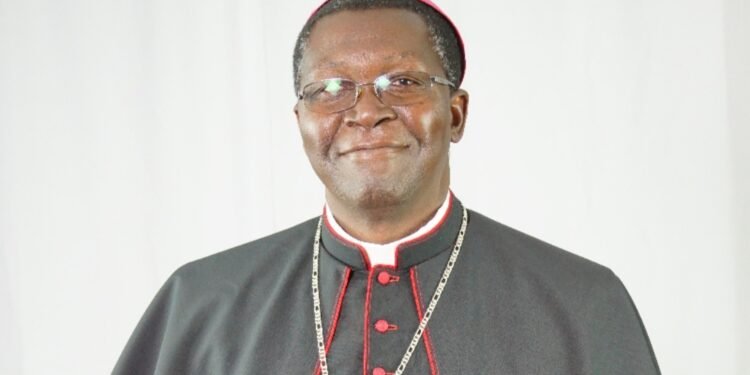ONE MAN’S CONSTITUTION
…He cannot be the only wise citizen, says Archbishop Chama
By Mast Reporter
HOW can one person claim to be the only wise citizen entitled to amend the Constitution while everyone else is expected to be mere recipients? Archbishop Ignatius Chama has wondered.
The head of the Catholic Church in the Archdiocese of Kasama in Northern Province and current president of the Zambia Conference of Catholic Bishops (ZCCB) was commenting in his personal capacity on calls for him to state the position of the Catholic Church on the controversial constitutional amendments proposed by President Hakainde Hichilema’s United Party for National Development (UPND) administration.
In a statement, which he read in Bemba and is now circulating on social media, Archbishop Chama said any constitution written or amended without the participation of all the citizens was a personal constitution of the one who gave it.
“In all this, the Church in Zambia has already provided guidance: that constitutional reform is the responsibility of all citizens, and that every citizen must participate in the process from beginning to end. This is not the work of an individual. It must be a collaborative effort, where everyone agrees on how we want to govern ourselves. How can one person claim to be the only wise citizen, entitled to amend the Constitution while everyone else is expected to be mere recipients?” he said.
The proposals, which lack broad national consensus, have rent the country in the middle with the UPND and its allies saying they are progressive as they are meant to increase representation in Parliament and ease the management of public affairs.
But critics, who include opposition political parties, the Church, civil society organisations and academics, have argued that there has not been enough consultation with citizens and that the period remaining before next year’s general elections is too short for any meaningful engagement.
The critics have accused Hichilema and his government of planning to use the amendments to increase the number of their MPs in Parliament to make it easy for them to make any changes to the supreme law and pass any unpopular law as they wished.
“The government is going around the provinces informing people about the proposed changes. However, this process does not appear to be a genuine attempt to obtain the people’s views, the very people who are the true owners of the Constitution. What is being done is akin to someone who claims to know the people’s needs, makes his own judgement, and then goes around saying: ‘I have come to deliver your most deeply felt needs, and I will draft laws that will ensure your comfort.’ The only role left for the beneficiaries is to say, “Thank you very much, well done, sir!” Archbishop Chama said.
He noted that every time the Constitution was brought up, conflict followed, saying some stakeholders considered themselves more important to the process than others. “They believe they alone have the nation’s best interests at heart,” Archbishop Chama said.
He wondered whether 30 days was enough time for the members of Parliament who are expected to pass the bill for Hichilema to sign into law will have enough time to its content intelligently.
“It is not even clear whether members of Parliament will have a real opportunity to make meaningful contributions to this process once debate begins on the amendments the government wants to make to the Constitution. We can only pray for the Holy Spirit, the Spirit of Truth, to be with them and to guide them in doing what is right for the future of our nation,” Archbishop Chama.
“Some people have been asking me what my personal view and role in all this is. I want to reiterate what I said on 9th April this year. I said that the faithful have a duty to know what the Church teaches on such matters. My comment was that everyone has a duty to understand the Church’s teaching on civic responsibilities. What I said, verbatim, was: ‘It is good to know what the Church teaches, so that you are not confused when such matters arise in the nation and become a subject of debate. This is similar to what happened in 1991, 1996, 2019, and 2020, when this issue came up’.”
Archbishop Chama hoped that the media would treat his statement as the Catholic Church’s response to those who had asked for its position on the constitutional reforms.
“I also hope that I will not be asked the same question again regarding the Church’s stance on this matter,” he said.

























